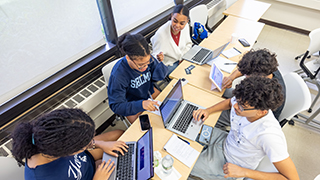College of Arts and Sciences Makes Considerable Investment in Undergraduate STEM Research
Wednesday, February 14, 2024
 This semester, the College of Arts and Sciences launched an exciting new initiative to support undergraduate students performing
original research with faculty mentors in the four STEM departments: Biological Sciences, Chemistry and Biochemistry, Mathematics and Computer Science, and Physics. With the support of strategic funding from the President and Provost and additional
funding from the Office of the Dean, eighteen students are being enabled to work side
by side on innovative research over the course of the spring and summer of 2024. Generous
stipends allow students to spend time in the laboratory or doing theoretical research
instead of working full time. Faculty mentors also receive summer support and supplemental
funding for supplies to further their research.
This semester, the College of Arts and Sciences launched an exciting new initiative to support undergraduate students performing
original research with faculty mentors in the four STEM departments: Biological Sciences, Chemistry and Biochemistry, Mathematics and Computer Science, and Physics. With the support of strategic funding from the President and Provost and additional
funding from the Office of the Dean, eighteen students are being enabled to work side
by side on innovative research over the course of the spring and summer of 2024. Generous
stipends allow students to spend time in the laboratory or doing theoretical research
instead of working full time. Faculty mentors also receive summer support and supplemental
funding for supplies to further their research.
Inaugurated this year, this innovative program, by providing support to both students and their faculty mentors, enables the production of research that leads first to external conference presentations and ultimately to publications. The University offers many opportunities for students to perform original research in partnership with faculty. The stipends involved in these initiatives help ensure that students can enjoy the benefits of close mentorship, hands-on research experience, conference presentation experience, and co-authorship on publications regardless of their financial circumstances. The competitive application process evaluated submissions based on their academic promise. As a requirement in this program, students will present their research at Seton Hall’s annual Petersheim Academic Exposition, our celebration of academic and scholarly work across the institution. They will be strongly encouraged and supported to present at national and international conferences and to ultimately publish the work alongside their faculty mentors.
Nicholas Snow, Ph.D., founding endowed professor in chemistry and biochemistry and a Seton Hall faculty member for 30-years says "this is the largest single investment in undergraduate research by Seton Hall in my time here. I am looking forward to seeing the fruits of this research across the sciences."
The research projects cover a wide range of disciplines and topics, including neuroscience, virology, bacteriology, computer programming and coding, artificial intelligence, machine learning, materials science, sensors, photoacids, cancer biomarkers, and photocatalytic oxidation. According to Jonathan Farina, Ph.D., interim dean of the College of Arts and Sciences, "Seton Hall has significant faculty expertise and grant-funded projects in all these areas, and this initiative allows students to benefit more from that success."
Interim President Katia Passerini, who helped conceive this program while serving as provost concurs, "This exciting initiative aligns with our strategic plan commitments to increase both experiential learning opportunities for students and support for faculty research. It also bolsters our investment in strategic areas of growth at the University - artificial intelligence, informatics, engineering, biology and biochemistry, cybersecurity, renewable energy."
The undergraduate STEM research grants are part of a larger institutional STEM initiative, which includes expanding research and academic programming, investments in faculty and facilities that will lead our students to greater career opportunities in science, technology, engineering, and mathematics. Other recent STEM initiative investments include the new M.S. in Applied Physics and Engineering, renovations to the CyberX cybersecurity lab, and expanded support for the Robotics Team.
Categories: Education, Research, Science and Technology






